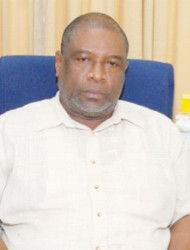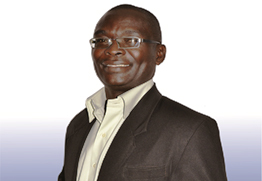Promotion and appointments in the public service, including to the post of Per-manent Secretary (PS), should be based on merit, the Public Service Commission of Inquiry (CoI) was told yesterday.

Derrick Cummings was among three permanent secretaries who testified when the public hearings being hosted by the CoI continued yesterday at the Depart-ment of Public Service Building, at Waterloo Street, Georgetown.
Cummings, who joined the public service in 1972, currently performs PS duties for two ministries, Tourism and Business, since a PS has not yet been appointed for the latter.
During his testimony before Commis-sioners Professor Harold Lutchman (Chairman), Sandra Jones and Samuel Goolsarran, Cummings was asked to share his thoughts on whether permanent secretaries should be subjected to political influences.
Cummings said he believes a PS is an extension of policies to be implemented by the ministers, who are politicians, and to that extent there would be the presence of political influences at the parliamentary and cabinet levels. Resultantly, he said, a PS is not totally devoid of political influences but he added that the politician should not have the kind of influence on the PS that causes a breach of integrity or unlawful acts.
Asked by the Chairman what should be the reaction of a PS to a minister who may be in breach of laws or rules and regulations governing a ministry, Cummings said there needs to be some sort of recourse in such matters. He said a PS should “point out, respectfully” through dialogue, what the particular breach may have been so that a resolution may be met. He noted that the minister’s position on an issue may have been influenced by other factors and so it is important to first engage in dialogue.
Cummings, however, added that if, after dialogue, the issue persists and the PS feels very strongly about his or her position, and that the minister may not be acting in the best interest of the public, then recourse should be had to the president.

He said that he would not say that the minister should be prosecuted, while explaining that this should be left up to the state but he noted that the PS should report the matter to the Minister of State.
On the issue of contracted and non-contracted Permanent Secretaries within ministries, Lutchman quizzed the witness on the manner of appointments for these two categories of workers. Cummings said while such issues are left to the person appointing the PS, it should not be done in such a way that undermines the traditional PS. He stressed that promotion and appointments to such positions should be based on merit.

Commissioner Goolsarran asked Cummings whether he believed that there should be one system of recruitment for the PS and public servants based on merit to allow for the introduction of fresh talents to compete with existing ones.
Cummings said the public service as the body responsible for implementing government policy should be equipped with the category of people to be professional and to serve on merit and ability and to compete for positions.
He said that the Public Service Commission should be the authoritative body tasked with such a responsibility, the president or someone working close to him.
Asked if the benefits are substantially different for contract workers in comparison to permanent staff, Cummings, who noted that his ministry has more contract than permanent workers, said that he could not say with certainty.
Asked if the leave passage is different for the two categories of workers, Cummings told Commissioner Goolsarran that it is determined based on the level of responsibility the person has.
Regarding training, Cummings said that this should be done periodically for public servants on a consistent basis to ensure greater efficiency and delivery of services
‘Appraisals’
Also testifying yesterday was Delma Nedd, who is the PS in the Ministry of Education.
Regarding possible issues with ministers which may arise and dealing with such, Nedd said her first means of recourse would be to refer to the Act governing her ministry to acquaint herself with guidelines stipulated therein regarding how to act. She said she has concerns when ministers may have made decisions which “are not good” and then the PS has to decipher how to address it. In such instances, she said, she refers to the guidelines. If it is something financial in nature, she said she will inform the Ministry of Finance in order to get feedback so that a resolution can be had.
In addressing contracted and permanent workers in the ministry, Nedd said that constant appraisals should be done to ensure that the persons assuming certain positions are doing so based on merit. She said sometimes no background work is done to substantiate a person’s competence to fill a position.
In response to a question from Commissioner Jones, Nedd said she does not think that proper performance appraisal systems are in place.
Asked about teachers and whether they fall under her purview, Nedd said yes but pointed out that they are appointed by the Teaching Service Commission. Asked about whether she has ever looked at the content of a teacher’s responsibility against that of other public servants, Nedd answered in the affirmative.
She said that from the outset, while teachers should be paid more, they start at an advantage in that a public servant with a degree from the University of Guyana (UG) as a public officer would generally get less than a teacher with a degree entering the school system.
Commissioner Jones pointed out that the advantage would be applicable to those at the higher end of the scale and she asked about the teachers at the lower end. In response, the PS said salary increases are paid based on status and that there is always room for a teacher to upgrade.
She noted that a teacher who has attended the Cyril Potter College of Education and also has a UG degree would have earned the status of a trained-graduate teacher. This, she said, presents a clear path for the teachers, while for a general public servant, once there is no promotion, the upgrade in salary is not realized.
She said that the option is better for the teacher.
The final witness for yesterday was Emil McGarrell, who is the PS in the Ministry of Communities.
Highlighting the general mandate of his ministry, he told the commission that he has responsibility for policy implementation. He noted that the ministry functions in four capacities, including housing, water, local government and regional development.
Quizzed on training of staff in his ministry, McGarrell told the Chairman that there is need for much assistance in that area. He said employees at the ministry must effectively know what it is to engage communities to properly respond to the needs of citizens and make meaningful contributions that would resolve those issues.
The CoI was set up by President David Granger to inquire into, report on, and make recommendations on the role, functions, recruitment process, remuneration and conditions of service for public servants.
The public hearings will continue on Friday at 10 am when Permanent Secretaries George Jarvis, Angela Johnson, Balraj Balram and Joslyn McKenzie of the ministries of Agriculture, Public Security, Public Infrastructure and the Department of Natural Resources, respectively, are scheduled to testify.









